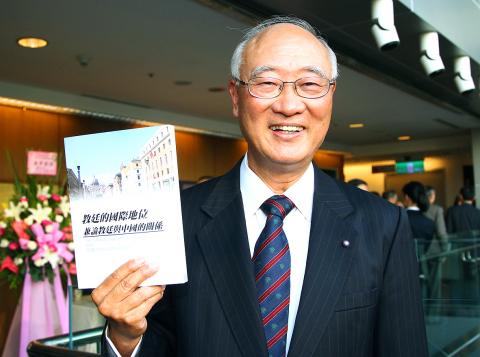The Vatican has long hoped to establish diplomatic relations with China, but that “could still be a long way off,” because dialogue between the two sides — let alone negotiations — has yet to develop, former ambassador to the Holy See Tou Chou-seng (杜筑生) said yesterday.
Having served as the nation’s ambassador to the Vatican, the only European state to maintain diplomatic ties with Taiwan, between 2003 and 2008, Tou recently published a book The International Status of the Holy See and its Relations with China (教廷的國際地位兼論教廷與中國的關係).
At a book launch, Tou spoke about the evolution of the Vatican’s China policy and possible future of relations between the Holy See, Taiwan and China, questions he said he was often asked about.

Photo: CNA
The incident last month, in which China stripped Ma Daqin (馬達欽), the auxiliary bishop of Shanghai, of his title has brought relations between China and the Vatican to a new low, Tou said.
Ma’s ordination, with the approval of China and the Vatican, had been seen as a hopeful sign that both sides could live with the disagreement over the appointment of Chinese bishops, but that hope was dashed after Ma was placed under house arrest for publicly renouncing the Chinese Catholic Patriotic Association (CCPA), Tou said.
The CCPA is China’s state-run organization that controls the state-backed Catholic Church and officially represents Chinese Catholics.
China runs the country’s Catholic church independently of the Vatican, and if the situation remains unchanged, its aim of establishing ties with the papal state is “a quixotic goal,” he said.
The Vatican has long held a “one China” policy, except during a period when Pope Paul VI served as pope and advocated a “two China” policy in 1964 that would see the UN recognize the People’s Republic of China without dropping the Republic of China, Tou said.
When former president Chen Shui-bian (陳水扁) was re-elected in 2004, he had wished that the nation’s diplomatic allies could add “Taiwan” to the names of their embassy in Taipei, Tou said.
“Although the Holy See did not oppose the idea, it has never changed the name of its embassy in Taipei. It is still called the ‘Apostolic Nunciature in China,’ while Holy See secretariat of state has addressed the nation’s embassy in Vatican as the ‘Embassy of China to the Holy See’ in correspondence,” Tou said.
Tou said that he had, on various occasions, inquired with the Vatican about the possibility of it switching recognition from Taipei to Beijing, following hints by Vatican officials.
“The answer I received was always the same: That could only happen when most people in China enjoy freedom of religious beliefs,” he said.
That does not mean that the Vatican would never establish diplomatic ties with China, but the time has not yet come, he said.
In his book, Tou said that the Vatican has repeatedly promised Taiwan that the Chinese Regional Bishops’ Conference, informally known as the Bishops’ Conference of Taiwan, and the nation’s embassy in the Vatican will be informed of any major decision it makes on cross-strait relations.
It will not make a decision that would catch Taiwan unprepared, he said.

Several Chinese Nationalist Party (KMT) officials including Chairman Eric Chu (朱立倫) are to be summoned for questioning and then transferred to prosecutors for holding an illegal assembly in Taipei last night, the Taipei Police said today. Chu and two others hosted an illegal assembly and are to be requested to explain their actions, the Taipei City Police Department's Zhongzheng (中正) First Precinct said, referring to a protest held after Huang Lu Chin-ju (黃呂錦茹), KMT Taipei's chapter director, and several other KMT staffers were questioned for alleged signature forgery in recall petitions against Democratic Progressive Party (DPP) legislators. Taipei prosecutors had filed

Taiwan would welcome the return of Honduras as a diplomatic ally if its next president decides to make such a move, Minister of Foreign Affairs Lin Chia-lung (林佳龍) said yesterday. “Of course, we would welcome Honduras if they want to restore diplomatic ties with Taiwan after their elections,” Lin said at a meeting of the legislature’s Foreign Affairs and National Defense Committee, when asked to comment on statements made by two of the three Honduran presidential candidates during the presidential campaign in the Central American country. Taiwan is paying close attention to the region as a whole in the wake of a

NEW WORLD: Taiwan is pursuing innovative approaches to international relations through economics, trade and values-based diplomacy, the foreign minister said Taiwan would implement a “three-chain strategy” that promotes democratic values in response to US tariffs, Minister of Foreign Affairs Lin Chia-lung (林佳龍) said. Taiwan would aim to create a “global democratic value chain,” seek to capitalize on its position within the first island chain and promote a “non-red supply chain,” Lin was quoted as saying in the ministry’s written report to the Legislative Yuan submitted ahead of the legislature’s Foreign Affairs and National Defense Committee meeting slated for today. The Ministry would also uphold a spirit of mutual beneficial collaboration, maintaining close communication and consultations with Washington to show that Taiwan-US cooperation

President William Lai (賴清德) has appointed former vice president Chen Chien-jen (陳建仁) to attend the late Pope Francis’ funeral at the Vatican City on Saturday on his behalf, the Ministry of Foreign Affairs said today. The Holy See announced Francis’ funeral would take place on Saturday at 10am in St Peter’s Square. The ministry expressed condolences over Francis’ passing and said that Chen would represent Taiwan at the funeral and offer condolences in person. Taiwan and the Vatican have a long-standing and close diplomatic relationship, the ministry said. Both sides agreed to have Chen represent Taiwan at the funeral, given his Catholic identity and